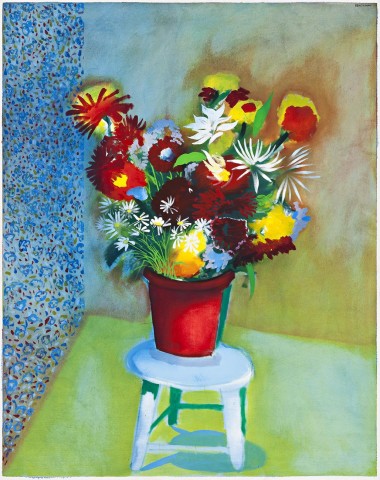FLOWERS IN THE RED VASE, 1973
CHARLES BLACKMAN
oil on canvas
174.0 x 138.0 cm
signed and dated upper right: BLACKMAN 73
Savill Galleries, Sydney (label attached verso)
Private collection, Perth
Charles Blackman, Fuji Television Gallery, Tokyo, 12 – 22 September 1973, cat. 11 (illus. in exhibition catalogue)
Possibly: South Yarra Gallery, Melbourne, March 1974
Intimate Reflections, Charles Blackman, Savill Galleries, Sydney, 13 March – 12 April 1997, cat. 28 (as ‘Still Life: Vase of Flowers Placed on a Stool’)
The art of floral still life painting has been a constant within Australian art for over two centuries, whether as watercolours in colonial journals or the more formal expressions painted in oil on canvas. The country’s most notable artists have practiced its form, each imbuing their images with their own aesthetic, be that the Surrealist undercurrents favoured by Adrien Feint, the indigenous-inspired nationalism championed by Margaret Preston or the neon coloured updates by Howard Arkley, based in turn on 1950s versions by John Brack. In Charles Blackman’s still lifes, such as Flowers in the Red Vase, 1973, the blooms appear like stills taken from a dream, hesitant even furtive visions which nonetheless burn with strange light emanating from within and from without.
Blackman painted flowers from his earliest married days, images which evolved ‘as a result of living near the flower farms at Tamborine, and the close proximity to gardens and bouquets … at (his mother-in-law) Mrs Patterson’s home, where the Blackmans were staying and working’.1 Subsequently, individual blooms appear in his Schoolgirls series of 1952 – 53; floral bouquets and gardens dominate many of his landmark Alice in Wonderland paintings; and the ‘Young Girls with Flowers’ sequence bracketed the decade before the family moved to London. Blackman would later say that ‘I think with the original sort of thing with the flowers, what emerged was that in relation to them, human beings start to do certain kinds of things. They were always in relation to them in a particular kind of mood; that is, the flowers evoked the people, in a certain kind of gentility, or substance, or reverence, or sensitivity’2 Also informing many of these works was the fact that as his wife Barbara became increasingly blind, the bright colours of flowers being some of her last remembered visions, their floral perfume became more acute as her sense of smell developed in inverse proportion. The fading of vision also informs Blackman’s use of strong colour in his paintings which seems to burst from otherwise fuzzy edges and indeterminate space, hence the use by commentators of ‘dreamlike’ as an expression to describe his oeuvre.
In 1972, Blackman purchased 100 acres on the Macdonald River at St Albans, where he built a simple cottage and studio. Always disciplined and productive, he soon began preparing for a series of exhibitions including one in Japan the following year, the result of an invitation from Fuji Television in Tokyo, which operated an influential gallery devoted to introducing painters from overseas. Blackman presented 28 paintings anchored around a small group based on the tumultuous lives of Scott and Zelda Fitzgerald. Continuing his fascination with flowers, he also included the monumental paintings Hour of a thousand flowers and Rock pool, destined to be made into tapestries, as well as Flowers in the Red Vase and its blue vase, horizontal companion. The Blackmans spent three weeks in Japan with the artist being interviewed about the exhibition on television. The show also made strong sales with three works being sold to a Japanese gallery of twentieth century art.3
1. Shapcott, T., Focus on Charles Blackman, University of Queensland Press, Brisbane, 1967, p. 37
2. Shapcott, T., op cit., p. 36
3. See: Moore, F. St. J., Charles Blackman: Schoolgirls and Angels, National Gallery of Victoria, Melbourne, 1993, p. 25
ANDREW GAYNOR
